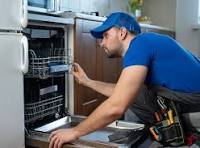
Common Dishwasher Problems & How to Troubleshoot or Repair
1. Dishwasher Not Turning On
- Check Power: Make sure that the dishwasher is plugged in and the circuit breaker is not flipped. If the dishwasher has a power switch, ensure it is set to the “on” position.
- Door Latch: The dishwasher will not start if the door is opened. Ensure that the door is closed tightly.
- Defective Control Board or Door Switch: If the two above check out okay, then the door switch or the control board is the likely culprit that should be replaced.
2. Dishes Not Getting Clean
- Blocked Spray Arms: Check the spray arms if they are blocked with food or limescale build up because you have hard water. Clear any blockage and check the arms by trying to rotate the arms by hand.
- Dirty Filters: You have food chunked up in the dishwasher filters. If your filters are free flowing, you won’t clean effectively. Remove the filters (usually at the bottom) and wash well.
- Incorrect Detergent: Make sure you’re using the correct formulation of detergent (powder, gel, or pod) appropriate for the machine. Excess or the incorrect formulation will be left as residues.
- Temperature of Water: The water should be hot enough so that it will clean well. The dishwasher will need at least 120°F (49°C) water. Check the high-temperature setting on the hot water heater.
3. Dishwasher Not Draining
- Check Drain Hose: Sometimes the grease or food clogs the drain hose. Open the hose at the dishwasher end and the end at the sink drain. Pick out any clogging material.
- Clogged Filter: A clogged filter can prevent proper drainage. Clean the filter thoroughly.
- Faulty Drain Pump: If the pump is defective, you will be replacing the pump. Some technical level of experience will be needed here while you are tearing apart dishwasher components.
4. Leaking Water
- Door Seal/Gasket: Most leaks come from a cracked door seal. Check the door seal for tears, cracks, or either moldy buildup. If cracked it will need to be replaced.
- Clogged Drain Pump: A clogged drain pump could cause water to overflow from the bottom of the dishwasher. Check and clean out the pump area.
- Overloaded: Overloading the dishwasher or incorrect placement of dishes may also cause water to overflow at different points in the wash cycle.
5. Dishwasher Making Strange Noises
- Spray Arms Blocked: Make sure the spray arms are not being blocked by large pots, pans, and other commercial equipment.
- Loose Parts: If a part is loose or broken (e.g., the spray arm or racks), it may create noise during operation.
- Damaged Pump/Motor: The motor and/or pump might be damaged leading to the grinding, humming or squealing sound. The pump or motor will need to be replaced.
6. Foul Odors
- Food Deposits in Filter or Drain: Deposits of food can lead to bad odors especially if the dishwasher is not draining properly or the food is being left in the dishwasher. If you notice any deposits of food, regularly clean the filters and drain.
- Wash with Vinegar: If you’re getting odors, run an empty load with the lower rack and a cup of vinegar.
- Check the Garbage Disposal: If the dishwasher is draining through a garbage disposal, it is worth checking your garbage disposal to ensure that it is free from any punctuated blockage. If your garbage disposal is jammed, it can also generate some bad smells in the dishwasher.
7. Dishwasher Not Drying Dishes
- Faulty Heating Element: The heating element is utilized in most dishwashers during the drying cycle. If the heating element is damaged then the drying function will fail. Test the heating element’s continuity with a multimeter.
- Rinse Aid: If you don’t use rinse aid or the dispenser is out of rinse aid, you may have poor drying quality. The rinse aid causes the water to evaporate more readily and prevents streaks on dishes.
A Dishwasher Repair Service is designed to address and fix a wide range of issues that can arise with dishwashers. Whether your dishwasher isn’t cleaning properly, leaking, or failing to start, professional repair services can help restore your appliance to working condition.
Summary:-
Dishwashers are convenient appliances that save time and effort in the kitchen, but they do require regular maintenance and occasional repairs. Common problems include issues with cleaning performance, draining, leaking, and not turning on. Most of these issues can be troubleshooted and repaired by a DIYer, but more complex issues, such as motor failure or electrical problems, should be handled by a professional. Regular cleaning, using the right detergent, and checking for clogs will keep your dishwasher running efficiently for years.


